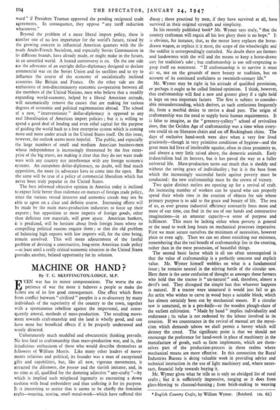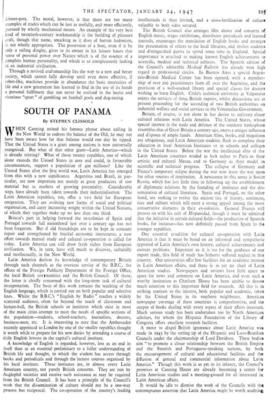MACHINE OR HAND ?
By T. C. SKEFFINGTON-LODGE, M.P.
EVEN war has its minor compensations. The worse the ex- perience of war the more it behoves a people to make the fullest use of its few good consequences. One effect which flows from conflict between " civilised " peoples is a re-discovery by many individuals of the superiority of the country to the town, together
with a spontaneous rebellion against the impersonal, and conse- quently amoral, methods of mass-production. The resulting move- ment towards craftsmanship and the land is wholly good, and can have none but beneficial effects if it be properly understood and wisely directed.
Unfortunately much muddled and obscurantist thinking prevails. No less fatal to craftsmanship than mass-production was, and is, the injudicious enthusiasm of those who would describe themselves as followers of William Morris. Like many other leaders of move- ments religious and political, its founder was a man of exceptional gifts and capabilities, but, like all new, vigorous movements, it attracted the dilettante, the poseur and the slavish imitator, and, in no time at all, qualified for the damning adjective " arty-crafty "—by which is implied such misplaced ingenuity as encrusting a down cushion with bead embroidery and thus unfitting it for its purpose. It is interesting to notice that it seems to be chiefly the feminine crafts—weaving. sewing, small metal-work—which have suffered this decay ; those practised by men, if they have survived at all, have survived in their original strength and simplicity.
In his recently published book* Mr. Wymer says truly, "that the country craftsman will regain all his lost glory there is no hope." It is obvious, for instance, that, as the motor lorry replaces the horse- drawn wagon, as replace it it must, the scope of the wheelwright and the saddler is correspondingly curtailed. No doubt there are farmers and landowners with the will and the means to keep a horse-drawn cart for tradition's sake ; but craftsmanship is too self-respecting to prop itself on sentiment. " If craftsmanship is to survive it must Co so, not on the grounds of mere beauty or tradition, but on account of its continued usefulness to twentieth-century life."
Mr. Wymer may be right in his attitude of qualified pessimism, or perhaps it ought to be called limited optimism. I think, however, that craftsmanship will find a new and greater glory if a tight hold is kept on two important factors. The first is subject to consider- able misunderstanding, which derives, as such confusions frequently do, from a morbid desire to revive a dead past. The origin of craftsmanship was the need to supply basic human requirements. It is false to imagine, as the " greenery-yallery " school of revivalists does, that the Golden Age of craftsmanship was a time when every- one could sit on Sheraton chairs and eat off Rockingham china. The days of exclusive hand-work were days when a very few lived graciously—though in very primitive conditions of hygiene—and the great mass led lives of intolerable squalor, often in close proximity to, and always a very little raised above, the domestic animals. Early industrialism had its horrors, but it has paved the way to a fuller universal life. Mass-production turns out much that is shoddy and without the saving grace of individuality ; but it is the base from which the increasingly successful battle against poverty must be conducted: the new craftsmanship must be the crown of victory.
Two quite distinct outlets are opening up for a revival of craft. An increasing number of workers can be spared who can properly spend their whole time in the creation of objects for sale whose primary purpose is to add to the grace and beauty of life. The rest of us, as ever greater industrial efficiency constantly frees more and more of our time, can find in the use of our hands and constructive imaginations—in an amateur capacity—a sense of purpose and fulfilment. This must be lacking either when poverty is general or the need to work long hours on mechanical processes imperative. First we must secure ourselves the minimum of necessities, however plain or even ugly. Then we can set about enriching our existence, remembering that the real benefit of craftsmanship lies in the creating, rather than in the mere possession, of beautiful things.
The second basic factor which is all too often unrecognised is that the value of craftsmanship is a perfectly concrete and explicit value. Mr. Wymer himself wobbles on what is a fundamental issue ; he remains neutral. in the stirring battle of the circular saw. Here there is the same confusion of thought as amongst those farmers who hold that the tractor is " un-natural" and, therefore, almost a
devil's tool. They disregard the simple fact that whatever happens is natural. If a tractor were unnatural it would just fail to go. An artist who wishes to carve in wood buys a suitable block, which
has almost certainly been cut by mechanical means. If a circular saw is unnatural, so is a pen-knife--or the wooden plough-share of the earliest cultivation. " Made by hand " implies individuality and endurance ; its value is not reckoned by the labour involved in its creation. If we countenance in the revival of manual art the mysti- cism which demands taboos we shall permit a heresy which will
destroy the creed. The significant point is that we should not encourage the preference for hand-work in place of machinery in the manufacture of goods, such as farm implements, which are them- selves part of the production-process in those realms .where mechanical means are more effective. In this connection the Rural Industries Bureau is doing valuable work in providing adyice and technical instruction in the use of light machinery and, where neces- sary, financial help towards buying it.
Mr. Wymer gives what he tells us is only an abridged list of rural crafts ; but it is sufficiently impressive, ranging as it does from glass-blowing to charcoal-burning ; from brick-making to weaving * English Country Crafts, by William Wymer. (Batsford. 128. 6d.)
lobster-pots. The moral, however, is that there are too many examples of trades which can be just as usefully, and more efficiently, pursued by wholly mechanical means. An example of the very best kind of twentieth-century workmanship is the building of pleasure craft, though that name, smacking as it does of barren hedonism, is not wholly appropriate. The possession of a boat, even if it be only a sailing dinghy, gives to its owner in his leisure hours that sense of personal power over Nature which is of the essence of a complete human personality, and which is so conspicuously lacking in an industrial civilisation.
Through a revived craftsmanship lies the way to a new and better society, which cannot fully develop until even more effective, if robot-like, machines provide in abundance the basic necessities of life and a new generation has learned to find in the use of its hands a personal fulfilment that can never be realised in the hectic and vicarious "sport" of gambling on football pools and dog-racing.



































 Previous page
Previous page